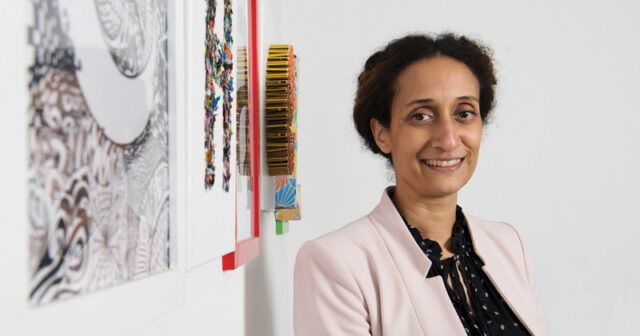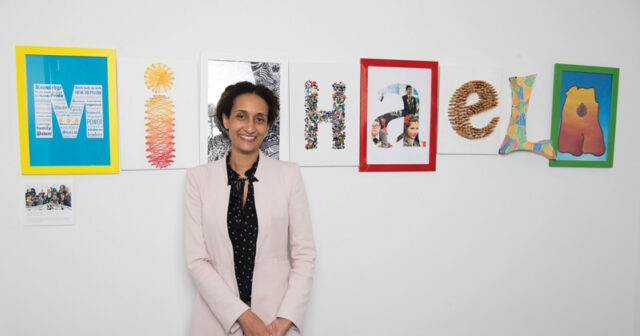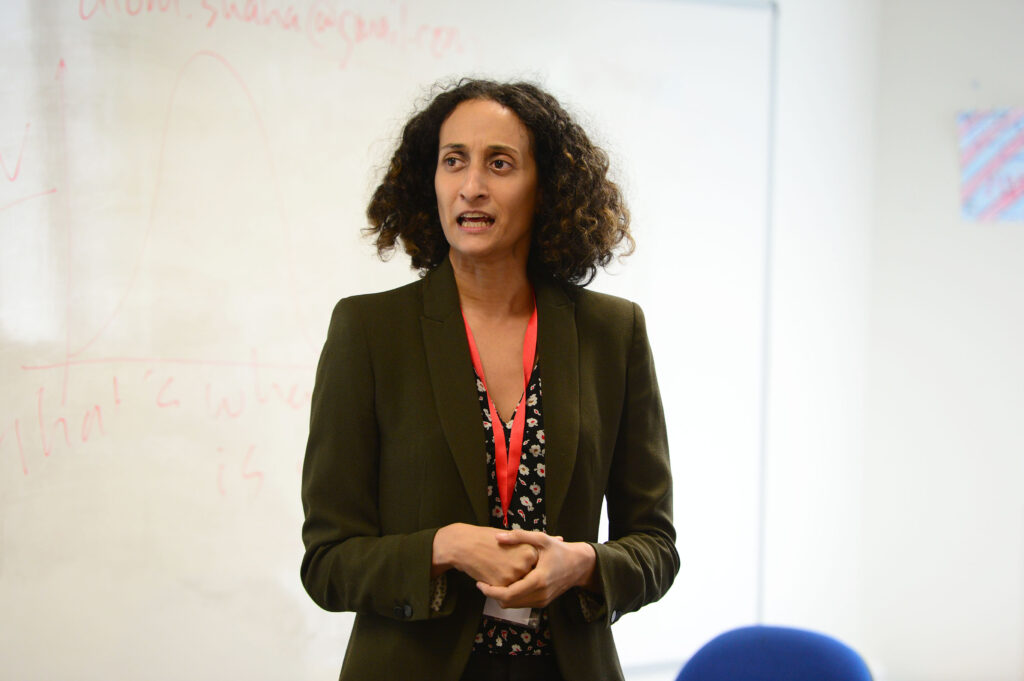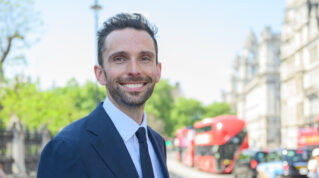A customised Marmite jar stands on Katharine Birbalsingh’s desk, with the name “Michaela” emblazoned across it.
It’s a stroke of marketing genius. The education world seems to be divided into those who adore the no-excuses, knowledge-focused, silent-corridor secondary school she established, and those who recoil at its very mention. Controversial policies include ditching SEND labels, giving detentions for failing to have a pen, and insisting on no excuses for failing to do homework – even if your mum is in hospital.
But Birbalsingh is here to quash a myth: she doesn’t believe that Michaela Community School has it right and everyone else has it wrong.
“All I’m saying is, that elsewhere you might find… How else am I meant to say it?” she exclaims, genuinely perplexed.
Visitors to Michaela, a secondary comprehensive in a deprived borough of north-west London, are so frequent and the pupils so well trained that lessons continue regardless, even as strangers traipse past the rows of desks to huddle at the back and observe.
Their tour process, with its open-door classroom policy and polite pupil guides, has been documented prolifically, and so have distinctive practices like the public “appreciations” after lunch – when teachers judge pupils on their voice projection – or their penchant for displaying students’ work in the bathrooms.
 So I’ve come here, to this unremarkable concrete block beside a railway track in Brent, to ask its headteacher about something else.
So I’ve come here, to this unremarkable concrete block beside a railway track in Brent, to ask its headteacher about something else.
But before I get to meet her, two pupils are called out of lessons, handed the standard-issue 30-minute countdown timer and asked to show me around.
Much of what I see feels familiar from what I’ve read – from the SLANT method in class, where pupils are trained to sit up straight and track the teacher with their eyes, to the barked-out 10-second countdown for transitioning between tasks.
What I’m not expecting, however, is for the pupils to seem quite so – how to put this – middle class? My year 9 guide looks me straight in the eyes, proffers his hand, introduces himself and asks whether there’s anything in particular I was hoping to see today.
As the tour ends and I’m ushered upstairs to meet the school’s founder, I log a note to quiz her about this. But first, I have something to get off my chest.
We actually got death threats. You know, that’s how bad it is
One of the biggest criticisms of Birbalsingh within the schools community is that, rather than tip her hat to the great and the good of the ‘Knowledge is power programme’ movement – from which she has borrowed many strategies – the Michaela way has been to insist, whether in blogs, books, podcasts or talks, that nobody does things like they do.
For this reason, in Katharine Birbalsingh I’m expecting to meet a character of Manichean certainty.
Instead, I encounter a woman who claims her core philosophy is to question everything. “We change our minds all the time!” she says. “Ultimately, research is great, and it does inform you in certain ways. But the main thing that drives the school is experience, and what we see working, what we see not working.
“It’s not that we started with a particular philosophy because we read it in a book. It’s quite the opposite, which is that we are constantly changing our minds about things. We try something, and if it doesn’t work – and you can tell whether something works or doesn’t work immediately, in a couple of weeks you can see – so that you can just change your mind.”
So why does Michaela insist that they’re the only ones running a school the right way?
“What you’re saying there just isn’t true,” she insists. “I don’t want to be saying about schools that they’re doing the wrong thing.”
You have a PR problem, I tell her.
The media attention that followed her 2010 speech to the Conservative Party conference divided opinion into those who loved her no-nonsense approach and those who saw her as a traitor. A French teacher whose anonymous blog had won her a book deal, she was introduced by her publisher to the then-education secretary Michael Gove, who promptly spotted she was Tory conference gold, and invited her to speak in Birmingham.
She pitched her presentation perfectly, promising to “expose some of the truths about the education system”, lambasting the “broken” system that “keeps poor children poor“ with its “culture of excuses”. The crowd lapped up her conversion story from a “serious leftie” to feeling “literally shame” because in the last election, she had voted Conservative.
Although she paints herself retrospectively as a politically-naive teacher in Brixton “who spent all her time marking”, she worked the crowd like a pro. So how did she get so good at public speaking? She looks at me like I’m a bit dim. “I’m a teacher, I do it every day.”
The footage shows Gove grinning in delight. Some say she got three standing ovations, others say it was just one, very long one. Birbalsingh says, deprecatingly: “had they not been bored to tears in the morning, maybe they wouldn’t have given me a standing ovation”.
Since then she has faced down the world with defiance. First she didn’t care about Ofsted. But she framed a congratulatory letter from Nick Gibb anyway, and hung it on the wall of the toilet next to the office where they were planning to put the Ofsted inspectors, just in case.
I laugh as she relates the Ofsted toilet story – but underneath the entertaining anecdote, there’s an intimation of the pressure she was under to prove herself, and I find myself wondering about the strain of all those years of being a target of hate.

Her conference appearance led to a parting of ways with the south London secondary school at which she was deputy head. She was ostracised by many in the teaching community, considered toxic by potential employers, and told she would never work in state education again.
“It was the only thing I knew how to do well. I mean, that’s what I loved. All my friends used to say to me, ‘you may not earn as much money as we do, Katharine, but you love your job more than anybody we know’.”
She realised that the only way she could continue working with disadvantaged children – “because that’s what I love” – was to set up her own free school. It took three years to get a location approved and the meantime, she lived off her writing.
“During those three years, you don’t know that you’re going to succeed. You keep going, blindly, thinking ‘I’ve got to do this, I got to do this’ until you eventually get there.”
The kind of trads that are out there arguing what they’re arguing, they didn’t exist then
Now that she is the formidable head of an Ofsted-‘outstanding’ school, with a team of “tiger teachers” more on-message than the Catholic Church, it’s easy to write off her conference speech as a ploy to further her own career. Nothing could be further from the truth, she insists.
“Educationally, we’re in a very a very different landscape to the one in 2010,” she explains. “The kind of trads that are out there arguing what they’re arguing, they didn’t exist then, apart from maybe Andrew Old. So there was nobody to back me. There was nobody to argue from my side.”
After opening her free school in 2014, Birbalsingh and her staff received many hateful messages.
“We actually got death threats. You know, that’s how bad it is. We had a woman working in the office here, and she said ‘I love the school’ – she broke down into tears in front of me – ‘but I can’t stand reading all this stuff’. And, sadly, the people who were sending these kinds of messages, they don’t realise that you’re not sending it to me, you’re actually sending it to this poor woman, you know?”
In such a context, embracing a “love us or hate us” attitude may be an effective survival technique.
But could this defiance also be blinding Michaela’s founder to the unnecessary ways in which she’s alienating swathes of the education community, who might be swayed if only she and her team of acolytes would be a little less, well, self-righteous?
“But we’re not saying everybody else does it wrong,” she retorts, incredulously. “We’ve copied other schools in many, many ways. I go and visit other schools all the time and take ideas, and people come here.” The schools she cites by name are also KIPP-inspired: Mossbourne, Dixons Trinity and King Solomon Academy.
Not everything is up for debate, however. Take group work. “You show me somewhere – and I’ve been around the world a million times looking at schools from Brazil to India to China to South Africa, I’ve been everywhere,” she declares with characteristic hyperbole. “I have never seen it work.”
Over several hours of touring the school, whispered conversations in corridors or classrooms, and debates in her office, Birbalsingh trips over herself in an attempt to amend her stock phrases, and you can almost watch her brain cogs whirr as she processes what she thinks about reframing her language.
We’re not saying everybody else does it wrong
“At other schools,” she corrects herself. “At some schools… But it’s not some schools! It’s most schools. And it doesn’t have to be a criticism!”
She pauses and tries again.
“At many schools, the teachers are exhausted at the end of the day from dealing with behaviour. That doesn’t happen here.” They might be intellectually tired from their teaching, she explains, but that’s different.
We break for lunch, and proceed silently to the dining hall, where I get to choose my table. After we’re given permission to sit and a year 8 dumps a meagre spoonful of beans onto my baked potato, the children introduce themselves and ask my name, job and which university I went to.
They seem eager to lap up my company – not because it’s that scintillating (it’s not; I’m not particularly at ease with teens, despite having three of my own) but as if they’ve been encouraged to take advantage of such opportunities.

Birbalsingh confirms that she uses assemblies to instil these kinds of messages in the children: “We constantly talk about it, about getting into the best universities, and what do you need to do to compete with the other kids who are at private schools.”
The result, she says, is that “they can do all the stuff that private school kids can do. Now, some people might say ‘oh, but what private school kids do isn’t that great’. But to be able to negotiate your way round a dinner party or a luncheon with your clients when you get a job, these are all skills that you need.”
It occurs to me that Michaela is an unashamed social mobility project: a school set up to take in working-class children and churn out middle-class young adults.
If that seems too reductionist, perhaps it’s more accurate to say that its founder is driven by two core aims. First, that no child be ostracised at school.
I was friends with a Polish girl, and a girl from Chile, and the three of us were friends because we just didn’t fit anywhere
She attended high school in Canada, where the social groups were racially divided. “My parents are from the Caribbean, my father’s Indian Guyanese and my mother’s black Jamaican,” she says. “I was friends with a Polish girl, and a girl from Chile, and the three of us were friends because we just didn’t fit anywhere.”
This experience has informed her espousal of practices such as the family lunch, which forces children to mix. They serve vegetarian meals only, to avoid having to segregate children by religion, “so all of that division that I experienced as a kid doesn’t happen”.
She was also derided for wanting to work hard. “So one of the things I really wanted to make sure that would happen here is that kids would never feel that sense of peer pressure to be stupid, you know?”
She attended a London comprehensive during her sixth-form, when her father, a university professor, came over for a sabbatical, and from there, a teacher encouraged her to apply to Oxford.
At university she felt like the “state-educated kid who didn’t really know anything”. Although she got her head down and pulled a 2:1, she doesn’t have fond memories of her time, and wants to “make sure that these kids, when they get to Oxford and Cambridge, they don’t have the same experience that I had”.
This explains her second aim, which manifests in the school’s intensive focus on acquiring knowledge and cultural capital: that no child should feel out of their depth for knowing too little.
But does this drive not mean they are doing exactly the opposite, and ostracising the children who can’t conform to their standards – either behaviourally or academically?
Very few children leave, she says (Brent council confirmed that only four places had opened up in year 7 this school year). But she also believes in parental choice and that her school may not work for everyone.
“You know, I believe in different schools being different,” she says.
Lemon curd or Marmite? The choice is yours.
It’s a personal thing
Tell me something about you that you’re working on improving
I talk a lot. I try not to talk so much, but it doesn’t necessarily work. I’m not very good at stopping myself.
Who challenges you?
My SLTs challenge me. Not on how much I talk… But they challenge all the time. They just tell me I’m wrong constantly. In the end, they might recognise that the decision lies with me, and they’ll back that, but they will certainly make themselves known if they disagree with something.
Do you encourage feedback from teachers?
Massively. I have what we call an error-correction chart where you can get a star for sending a note to us to say “this needs fixing in the school”. Then at the end of the half term, I’ll give out chocolate bars to the top three people with the most stars. That’s just to try and get them to want to tell us “this is what’s happening here, you need to think about this” and so on and so forth.
If you could escape anywhere for a month, where would it be?
I wouldn’t want to switch off. I’d want to spend a week in different schools around the world. I’d have to pick the countries where I’d want to spend a week. That would be so exciting. It’d be amazing.
What would you have done if you hadn’t gone into teaching?
When I was a kid I wanted to be a builder. I quite like houses and how they’re built. You’ll notice I gave as an example [of what I’d do if I could never teach again] becoming an interior decorator, because all that kind of stuff around how you set up a room and the wall colours and builders and all of that, I quite like, I suppose. But I’m obsessed with education. I love it. If I couldn’t do it, I don’t know. I’d be really sad.
Do you have a favourite book?
I don’t know about a favourite. I recently read this book called Little Soldiers, which is about this Chinese-American woman who sends her child to a Chinese school. It’s about her experiences with the Chinese system. I really love it, because in talking about her experiences, she’s of course talking about educational theories and so on, that her boy is then experiencing, which of course is what I love.
What do you consider a great gift?
A great gift? Chocolate! Really nice chocolate. Bourneville is also quite nice, although that’s not necessarily quality, but it’s lovely. There is nothing nicer than chocolate.














So revealing how you use the phrase “if only she and her team of acolytes would be a little less, well, self-righteous” to describe Katharine Birbalsingh rather than the far greater number of her detractors who are so self righteous it must hurt.
As to what she and her team are doing, it seems to be working well for those that want to go there. As far as I’m aware nobody’s forced to choose that school so if they’d rather somewhere else they can.
Giving parents choice over different types of schools where they can send their children seems to be at the core of what the ultra-self-righteous can’t stand.
I’d like to know if unions are recognised in the school. Also, has the practice of only soup and bread at lunchtime for pupils who are in arrears, or have not yet paid, for lunch?